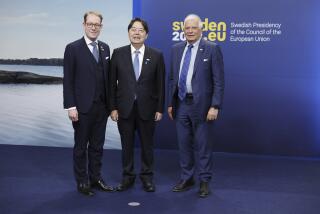Official Says Japan Will Need Nuclear Arms if N. Korea Threatens
- Share via
TOKYO — Foreign Minister Kabun Muto said Wednesday that Japan must have the will to build nuclear weapons if necessary to defend itself against a North Korean nuclear threat, the Nihon Keizai newspaper reported.
Muto made the statement only to Japanese reporters at a news conference in Singapore after assuring the Assn. of Southeast Asian Nations that Japan would offer unqualified support for an indefinite extension of the Nuclear Non-Proliferation Treaty (NPT). The outgoing foreign minister also told ASEAN foreign ministers that Japan has no intention of building a nuclear arsenal of its own.
Japan is the only nation in the world to have suffered nuclear attacks.
“There is a clause in the NPT allowing withdrawal from the treaty,” Muto said, according to the Nihon Keizai report as distributed by the newspaper’s electronic news service. “If North Korea develops nuclear weapons and that becomes a threat to Japan, first, there is the nuclear umbrella of the United States upon which we can rely. But if it comes down to a crunch, possessing the will that ‘we can do it’ is important,” he said.
Muto said he brought up the issue because Japan’s refusal at the Group of Seven economic summit in Tokyo this month to support without qualification an indefinite extension of the treaty had aroused suspicions of Japan’s intentions. A large shipment of plutonium from France and fears of North Korean nuclear development led some outsiders to conclude that Japan wants to keep a free hand to go nuclear.
In the meeting of ASEAN foreign ministers with their “dialogue partners,” including the United States, Muto denied that such suspicions were justified.
Before Japan can give unqualified support to an indefinite extension, he told the ASEAN conference, “some procedural matters” remain to be handled, including the persuasion of a small number of Japanese foes of the treaty.
Opposition to the treaty exists in Japan because of sentiment that the accord favors nuclear powers and discriminates against non-nuclear nations, such as Japan. Some Japanese also fear North Korea’s development of nuclear strength, he said.
To the ASEAN ministers and officials of the “dialogue nations,” he declared that Japan has no intention of going nuclear. Winston Lord, assistant secretary of state for East Asian and Pacific Affairs, called Muto’s statement “a very positive step forward in terms of extension of the treaty. We were pleased to hear his comments.”
But his statement to the Japanese reporters implied that Japan need not oppose indefinite extension of the treaty, because of a clause that allows any nation to withdraw on three months’ notice.
More to Read
Sign up for Essential California
The most important California stories and recommendations in your inbox every morning.
You may occasionally receive promotional content from the Los Angeles Times.













